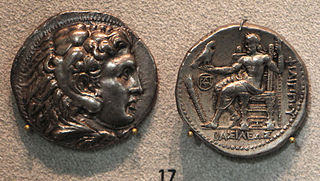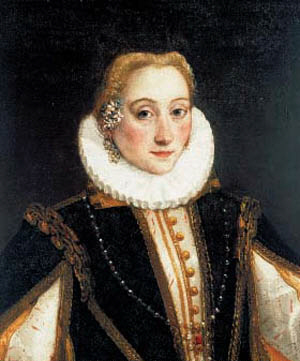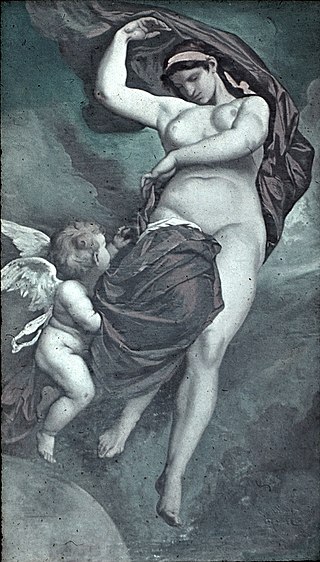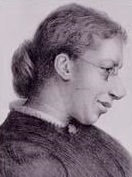Related Research Articles

Alexander I of Epirus, also known as Alexander Molossus, was a king of Epirus (343/2–331 BC) of the Aeacid dynasty. As the son of Neoptolemus I and brother of Olympias, Alexander I was an uncle, and a brother-in-law, of Alexander the Great. He was also an uncle of Pyrrhus of Epirus,.

In ancient Greek religion, Hera is the goddess of marriage, women and family, and the protector of women during childbirth. In Greek mythology, she is queen of the twelve Olympians and Mount Olympus, sister and wife of Zeus, and daughter of the Titans Cronus and Rhea. One of her defining characteristics in myth is her jealous and vengeful nature in dealing with any who offend her, especially Zeus' numerous adulterous lovers and illegitimate offspring.

Olympias was a Greek princess of the Molossians, and the eldest daughter of king Neoptolemus I of Epirus, the sister of Alexander I of Epirus, the fourth wife of Philip II, the king of Macedonia and the mother of Alexander the Great. She was extremely influential in Alexander's life and was recognized as de facto leader of Macedon during Alexander's conquests. After her son's death, she fought on behalf of Alexander's son Alexander IV, successfully defeating Adea Eurydice. After she was finally defeated by Cassander, his armies refused to execute her, and he finally had to summon family members of those Olympias had previously killed to end her life. According to the 1st century AD biographer, Plutarch, she was a devout member of the orgiastic snake-worshiping cult of Dionysus, and he suggests that she slept with snakes in her bed.

Hippodamia was a Greek mythological figure. She was the queen of Pisa as the wife of Pelops.

In Greek mythology, Peitho is the goddess who personifies persuasion and seduction. Her Roman equivalent is Suada or Suadela. She is the goddess of charming speech. She is typically presented as an important companion of Aphrodite. Her opposite is Bia, the personification of force. As a personification, she was sometimes imagined as a goddess and sometimes an abstract power with her name used both as a common and proper noun. There is evidence that Peitho was referred to as a goddess before she was referred to as an abstract concept, which is rare for a personification. Peitho represents both sexual and political persuasion. She is associated with the art of rhetoric.

Philip III Arrhidaeus reigned as king of Macedonia, an Ancient Greek Kingdom in northern Greece, from after 11 June 323 BC until his death. He was a son of King Philip II of Macedon by Philinna of Larissa, and thus an elder half-brother of Alexander the Great. Named Arrhidaeus at birth, he assumed the name Philip when he ascended to the throne.

Olympia Dukakis was an American actress. She performed in more than 130 stage productions, more than 60 films and in 50 television series. Best known as a screen actress, she started her career in theater. Not long after her arrival in New York City, she won an Obie Award for Best Actress in 1963 for her off-Broadway performance in Bertolt Brecht's Man Equals Man.

Olympia Jean Snowe is an American businesswoman and politician who was a United States Senator from Maine from 1995 to 2013. Snowe, a member of the Republican Party, became known for her ability to influence the outcome of close votes, including whether to end filibusters. In 2006, she was named one of America's Best Senators by Time magazine. Throughout her Senate career, she was considered one of the most moderate members of the chamber.

Cynisca or Kyniska was a wealthy Spartan princess. She is famous for being the first woman to win at the Olympic Games, competing in the sport of chariot racing. Cynisca first entered the Olympics in 396 BC, where she won first prize competing with a team of horses she had trained herself. In 392 BC, Cynisca entered her horses in the Olympics for a second time and was awarded another victory in the same event.

Olympia is a painting by Édouard Manet, first exhibited at the 1865 Paris Salon, which shows a nude woman ("Olympia") lying on a bed being brought flowers by a servant. Olympia was modelled by Victorine Meurent and Olympia's servant by the art model Laure. Olympia's confrontational gaze caused shock and astonishment when the painting was first exhibited because a number of details in the picture identified her as a prostitute. The French government acquired the painting in 1890 after a public subscription organized by Claude Monet. The painting is on display at the Musée d'Orsay, Paris.

Olimpia Fulvia Morata was an Italian classical scholar.
Cynane was half-sister to Alexander the Great, and daughter of Philip II by Audata, an Illyrian princess. She is estimated to have been born in 357 BC.

Timarete, was an ancient Greek painter.
The Heraea was an ancient Greek festival in which young girls competed in a footrace. The race was held every four years at Olympia, and probably took place around the same time as the ancient Olympic Games.

In Greek mythology, Nike was a goddess who personified victory in any field including art, music, war, and athletics. She is often portrayed in Greek art as Winged Victory in the motion of flight; however, she can also appear without wings as "Wingless Victory" when she is being portrayed as an attribute of another deity such as Athena. In Greek literature Nike is described as both an attribute and attendant to the gods Zeus and Athena. Nike gained this honored role beside Zeus during the Titanomachy where she was one of the first gods to offer her allegiance to Zeus. At Athens, Nike became a servant to Athena as well as an attribute of her due to the prominent status Athena held in her patron city. The fusion of the two goddesses at Athens has contributed to the ambiguity surrounding Nike's origins. It is unclear whether she originated from a character trait of the Greek goddess Athena or has always existed as an independent deity. Her origin story in Greek mythology is also slightly ambiguous, with the Theogony claiming Nike to be the daughter of Styx and Pallas while the Homeric Hymns describe Ares as being Nike's father. Her Roman equivalent was Victoria. The company Nike, Inc. was named after the goddess.
Audata was an Illyrian princess and wife of Philip II of Macedon.

(Emilia) Jessie Boucherett was an English campaigner for women's rights.

In Greek mythology, Gaia, also spelled Gaea, is the personification of the Earth and one of the Greek primordial deities. Gaia is the ancestral mother—sometimes parthenogenic—of all life. She is the mother of Uranus, from whose sexual union she bore the Titans, the Cyclopes, and the Giants; as well as of Pontus, from whose union she bore the primordial sea gods. Her equivalent in the Roman pantheon was Terra.

Princess Maria-Olympia of Greece and Denmark is a fashion model, socialite and member of the non-reigning Greek royal family. She is the oldest child and only daughter of Pavlos, Crown Prince of Greece, and his wife, Marie-Chantal Miller. Her paternal grandparents are Constantine II of Greece and Anne-Marie of Denmark, who were the last King and Queen of the Hellenes, while her maternal grandfather is duty free entrepreneur Robert Warren Miller.

Helen Blackburn was a feminist, writer and campaigner for women's rights, especially in the field of employment. Blackburn was an editor of the Englishwoman's Review magazine. She wrote books about women workers and a history of the women's suffrage movement in Britain and Ireland which became the "standard work". She served as secretary of the National Society for Women's Suffrage and the West of England Suffrage Society, and co-founded the Freedom of Labour Defence League. Her name appears on the plinth of the Millicent Fawcett statue in Parliament Square.
References
- 1 2 3 4 Marilyn Bailey Ogilvie; Joy Dorothy Harvey (2000). The Biographical Dictionary of Women in Science: L-Z. Taylor & Francis. pp. 962–. ISBN 978-0-415-92040-7.
- ↑ James Read Chadwick (1879). The Study and Practice of Medicine by Women. A.S. Barnes & Company. pp. 444–.
- ↑ Jessie Boucherett. The Englishwoman's review (of social and industrial questions) [ed. by J. Boucherett].